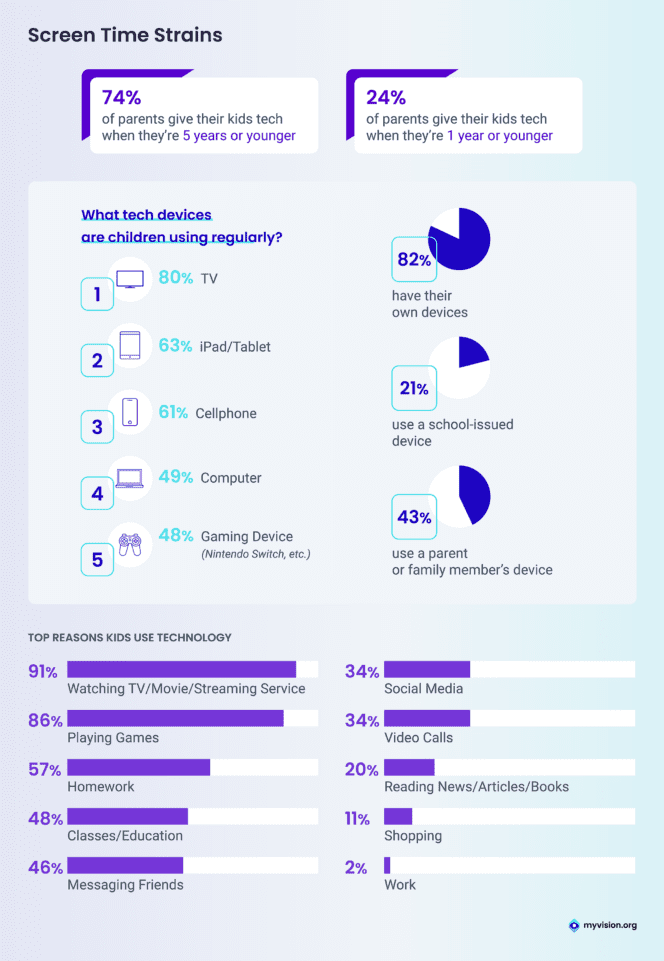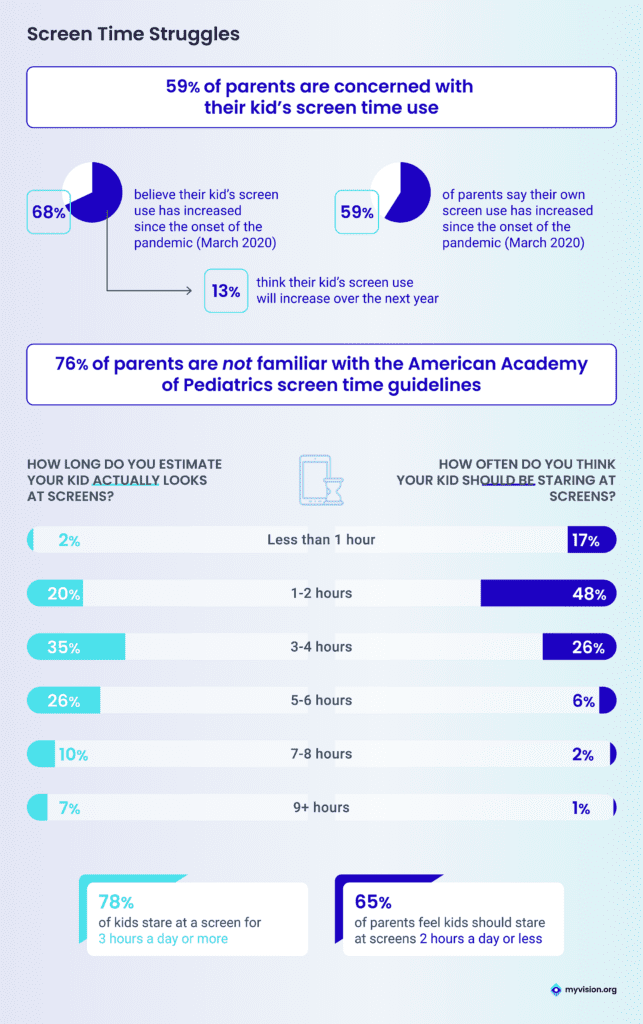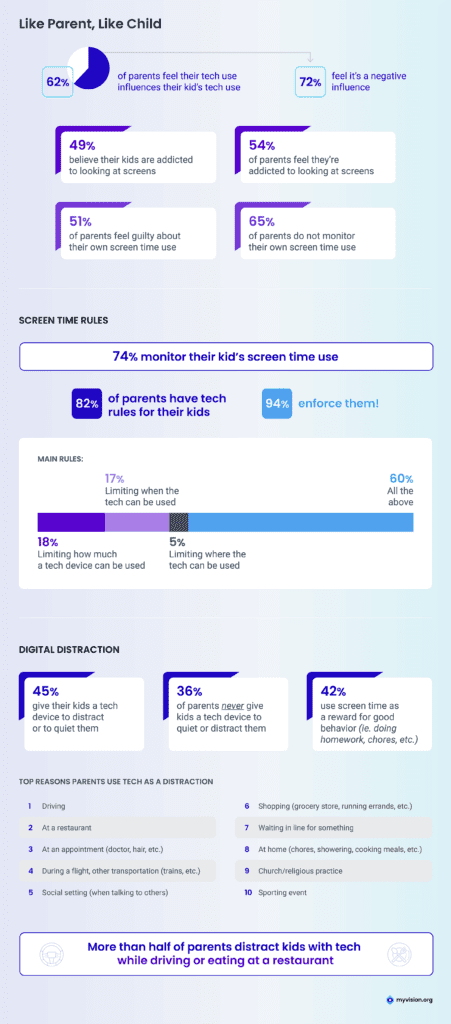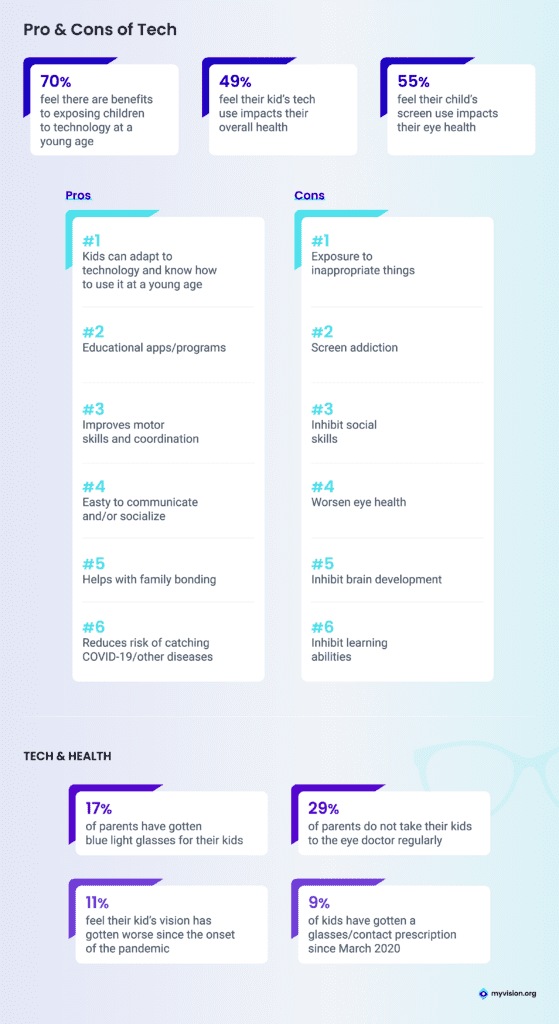It’s no exaggeration to say technology has taken over the world. We use it to learn, work, communicate, pay, play… the list goes on and on. While it is important, it can also easily become addicting. Addicting in our own lives, technology use has become a top concern to many parents. The American Academy of Pediatrics recommends kids under 5 spend less than 1 hour a day using screens, but many children are spending double or even triple that amount of time staring at a screen.
In a new survey, we asked nearly 1,000 parents and caretakers about screen time and their children. While many parents follow and stick to rules about technology use in their homes, they’re also worried about the example they’re setting through their own screen time.
Screen Time Strains

According to respondents, adults are giving their children different tech devices at a younger and younger age. Nearly 1 in 4 (24%) have let kids play with tech when they’re 1 year or younger. Nearly 3 in 4 (74%) parents have given devices to their children by the time they turn 5.
More than 4 out of 5 (82%) kids have their own device, with 21% having a school-issued device.
The main reason more than 90% of kids are using technology is for entertainment. Adults say their kids regularly watch shows, movies, and other content on streaming services. Kids are also using technology to play games (86%), which makes sense since the second most-used device is an iPad or tablet.
More than 60% of children use phones regularly and just under half play on the computer (49%) or on gaming consoles like a Nintendo Switch (48%).
The other top reasons kids are using technology include homework (57%), classes/education (48%), and messaging friends (46%).
Screen Time Struggles

Screen time is a major concern among parents and caretakers. Nearly 60% are worried about how much time their children spend staring at screens. Of course, the COVID-19 pandemic hasn’t helped with that. Nearly 70% of parents say their kid’s screen use has increased since the onset of the pandemic in 2020, and more than 1 out of 10 (13%) feel screen use will increase even more over the next year.
There are recommendations for the amount of screen time children, especially young children, should have. According to the American Academy of Pediatrics (AAP), kids under 2 should not have any access to devices except for video calls. Children between 2 and 5 should not have more than 1 hour of screen time daily.
Nearly 80% of parents surveyed do not know what the AAP recommendations are. In fact, only 22% estimate their kids spend 2 hours or less looking at screens. Nearly 80% of parents believe their child stares at a screen for more than 3 hours or longer daily. Nearly 1 out of 10 (7%) say their kid spends 9 hours or more looking at screens.
The majority of parents (65%) agree: they want their kids looking at screens for only 2 hours or less every day. Only 1 out of 10 (9%) felt like kids should be using technology 5 hours a day or more.
But kids aren’t the only ones who have been staring at screens more. Nearly 3 out of 5 (59%) adults surveyed recognize that their own screen time has increased since the onset of the pandemic.
Like Parent, Like Child

Despite being concerned over their children’s screen use, many adults admit to not setting the best example themselves. More than 3 out of 5 (62%) feel their tech use influences their children, and 72% feel it’s a negative influence.
Nearly half (49%) of parents believe their kids are addicted to technology, and 54% admit they themselves are addicted to looking at screens. Many adults (51%) feel guilty about their screen time, and 65% revealed they do not monitor their own screen time.
It’s a different story for children. Almost 3 in 4 (74%) monitor their kid’s screen time, 82% have rules, and a whopping 94% enforce them! The top 3 rules include limiting how much their children use technology, when they can use it, and where.
But parents don’t always follow their own rules. Nearly half (45%) shared they’ve used technology to distract or quiet their kids. The top reasons for using these digital distractions are because they’re driving, at a restaurant, or at an appointment. Only about 1 in 3 (36%) claimed they never use technology as a distraction.
Pros & Cons of Tech

There are both pros and cons when it comes to children and their use of technology. Some cons include the risk of exposing children to inappropriate things, encouraging screen addictions, impacting social skills, and affecting eyesight.
Nearly 1 out of 5 (17%) have bought blue light glasses for their kids, but 29% admit they do not take their kids to the eye doctor regularly. More than 1 in 10 believe their kid’s vision has gotten worse since the onset of the pandemic, and 9% of kids have gotten a glasses or contacts prescription since March 2020.
But technology is not all bad, and the majority (70%) feel there are benefits to introducing kids to technology at a young age.
The top benefits include allowing children to grow and adapt to changing tech, learning through educational apps and programs, improving motor skills and coordination, and it offers an easy way to communicate and socialize.
Technology is and always will be a part of life. While there’s no right answer for when and how to introduce devices to your kids, there are guidelines from doctors and experts you can follow.
Just remember you are human. There will be missteps and learning moments along the way, but you’re doing the best you can, and that’s all that matters.
Methodology
In June 2022, we surveyed 992 parents and caretakers who have children 17 years or younger to get their feedback about screen time and their children. Respondents ranged in age from 20 to 73 with an average age of 41. 50% were female, 49% male, and 1% were nonbinary.
For media inquiries, please contact media@digitalthirdcoast.net.
Fair Use
When using this data and research, please attribute by linking to this study and citing https://myvision.org/
Last Updated July 25, 2022
Note: This page should not serve as a substitute for professional medical advice from a doctor or specialist. Please review our about page for more information.